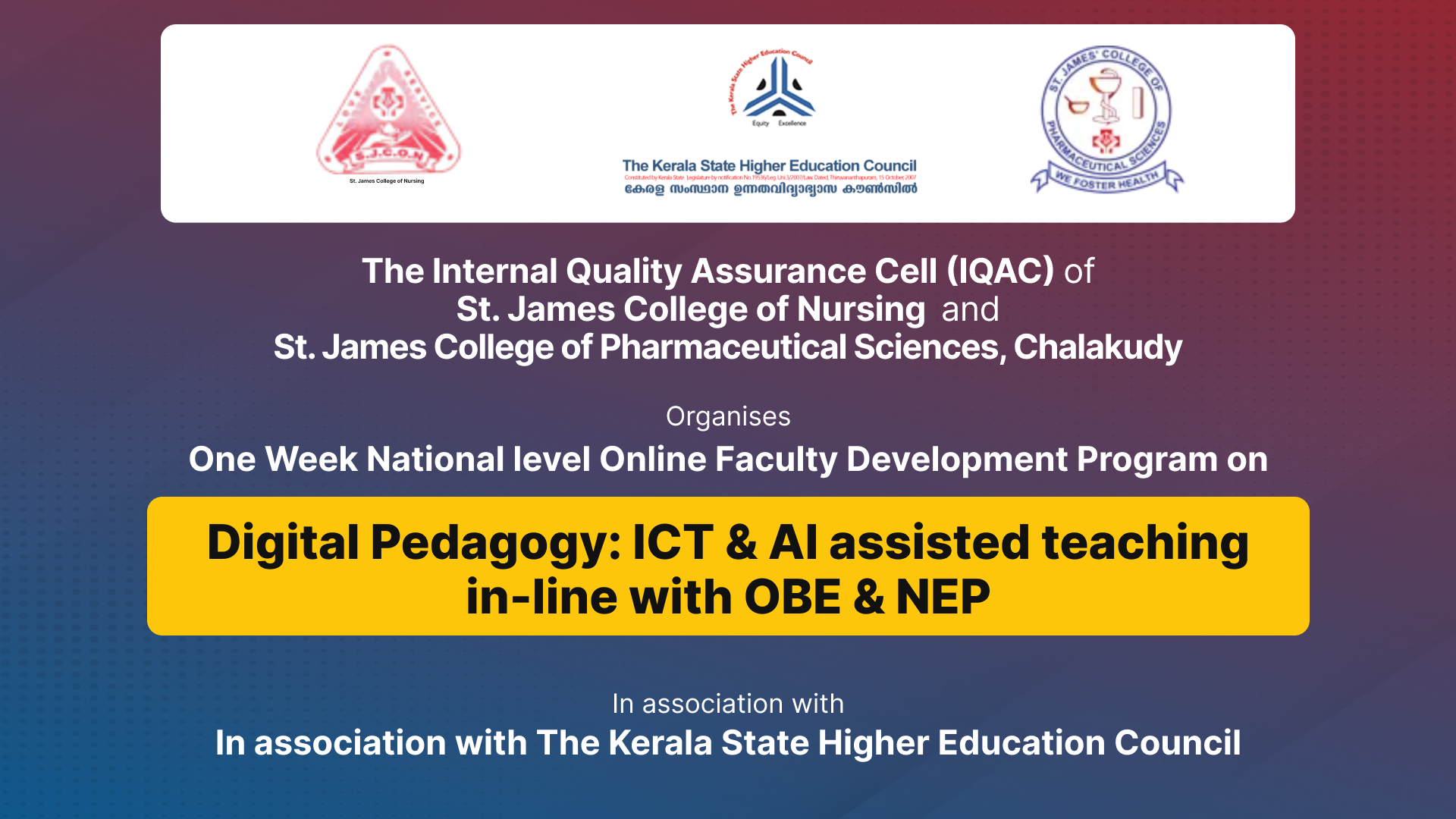
In today’s rapidly evolving educational landscape, integrating Digital Pedagogy, Information and Communication Technology (ICT) and Artificial Intelligence (AI) is transforming teaching and learning. This shift aligns seamlessly with the principles of Outcome Based Education (OBE) and New Education Policy (NEP) 2020, both of which emphasise a learner-centric approach. As higher education institutions strive to equip students with the skills needed for the 21st century, adopting these technologies has become essential.
Digital Pedagogy and ICT facilitate personalised learning experiences, allowing educators to tailor instruction to meet individual student needs. AI-powered tools can analyze student performance data to identify strengths and weaknesses, enabling targeted interventions. This personalized approach ensures that learning is more effective and aligned with the desired outcomes of OBE, where the focus is on achieving specific competencies and skills.
Using digital tools in education promotes a more interactive and engaging learning environment. Multimedia resources, virtual simulations, and online collaboration platforms make learning more dynamic and immersive. This interactive nature enhances understanding and retention and encourages active participation, critical thinking, and problem-solving skills among students, which are key objectives of both OBE and the NEP.
ICT and AI technologies provide robust platforms for continuous and formative assessment, a core element of OBE. Automated grading systems, online quizzes, and real-time feedback mechanisms enable educators to monitor student progress consistently. This ongoing assessment helps promptly identify learning gaps and provides opportunities for timely redemption, ensuring that all students achieve the desired learning outcomes.
Adopting Digital Pedagogy and ICT also plays a crucial role in faculty development. Online professional development courses, webinars, and digital teaching resources empower educators to enhance their teaching strategies and stay updated with the latest educational trends. AI tools can assist in curriculum development and content creation, helping educators design more effective and engaging learning experiences.
The National Education Policy 2020 advocates integrating technology into the education system to improve access, equity, and quality. By embracing Digital Pedagogy, and AI, higher education institutions can democratize learning, making it more inclusive, and accessible to diverse student populations. This alignment with NEP goals ensures that education is not only holistic and multidisciplinary but also adaptable to the needs of the digital age.
In short, the incorporation of digital pedagogy in line with OBE and NEP is essential for modernizing higher education as it not only enhances the quality and accessibility of education but also ensures that students are better prepared for the challenges of the future. Incorporating Digital Pedagogy, ICT and AI into higher education is not merely an enhancement but a necessity in today’s world. These technologies support the principles of Outcome Based Education and the directives of the National Education Policy 2020, fostering a learning environment that is dynamic, personalized, and inclusive. As technology evolves, the synergy between digital tools and educational frameworks will be pivotal in shaping a resilient and forward-thinking educational system.
Dr. Mendus Jacob
Professor & Director, MCA, Marian College Kuttikkanam (Autonomous) and MD & CEO of ipsr solutions limited.
A former Director of the School of Applicable Mathematics, MG University, Dr Mendus Jacob is an Academician and Entrepreneur with 35+ years of experience and a well-known resource person for FDPs in OBE, NEP and Accreditation.
Dr. Sunil Job KA
Associate Professor and Academic Mentor, Marian College, Kuttikkanam (Autonomous and Chief of Academics, ipsr solutions limited.
A resource person for several FDPs in OBE, Data Science, E-Learning etc., Dr Sunil has served as a Visiting Team Member of NCTE for ‘Grant of Recognition’ and as a resource person for the Affiliation Renewal Committee of MG University.
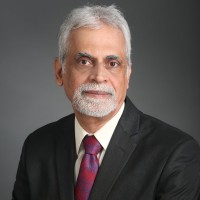
Dr. Suresh Namboothri
The Founder Member of Espoir Technologies Pune.
A former Chief Operating Officer with Tata Motors, he was part of the team that developed the first Indian car – Indica. A well-known resource person for FDPs on OBE, Critical and Creative Thinking, Dr Suresh Namboothiri, a designer and developer of 200+ products with over 30 years of industry experience, is also the founder of Espoir Technologies, Pune. He is a Mentor, Researcher, and Educator in addition to a senior Corporate Consultant.
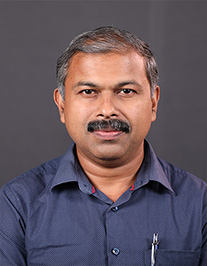
Dr. Binu Thomas
Associate Professor, Department of Computer Applications, Marian College Kuttikkanam, Autonomous.
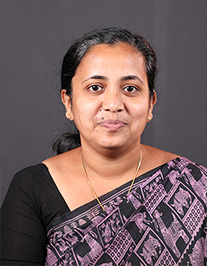
Ms. Kochumol Abraham
Assistant Professor, MCA, M Tech associated with the PG Department of Computer Application, Marian College Autonomous, Kuttikkanam.
Participants in the Faculty Development Programme include Deans, Heads of Departments, and Faculty Members from Higher Educational Institutions across the Indian States and abroad.
2183 participants benefited from the seven-day Faculty Development Programme on Digital Pedagogy: ICT and AI-Assisted Teaching in line with OBE and NEP organised by the Internal Quality Assurance Cell of St James College of Pharmaceuticals and St James College of Nursing in association with The Kerala State Higher Education Council.

The seven-day National Level Online Faculty Development Programme on Digital Pedagogy: ICT & AI Assisted Teaching in line with OBE & NEP organised by the Internal Quality Assurance Cell of St James College of Nursing and St James College of Pharmaceutical Sciences, Chalakudy in association with the Kerala State Higher Education Council started at 19.00 Hrs on the 29th of May 2024.

Inaugural Function:
The inaugural function of the week-long Faculty Development Programme on Digital Pedagogy: ICT and AI-Assisted Teaching in line with OBE and NEP jointly organised by St James College of Nursing and St James College of Pharmaceutical Sciences Chalakudy began at 19.00 Hrs on the 29 of May 2024.
Dr K Krishnakumar, Principal, Department of Pharmaceutical Analysis at St James College of Pharmaceutical Sciences, Chalakudy delivered the welcome speech. Dr Krishnakumar started his speech by thanking the Kerala State Higher Education Council for providing the chance to conduct the one-week Faculty Development Programme. He further went on to welcome Rev Fr Anto Alappadan, Director, St James Group of Institutions, Dr Rajan Gurukkal, the Honourable Vice Chairman of the Kerala State Higher Education Council, Dr Rajan Varghese, the Member Secretary of the Kerala State Higher Education Council, Rev Fr Manoj Mekkadath, Associate Director St James Hospital and St James Medical Academy, the resource persons of the program, the entire participants for their eager participation in the program, and Sr Symphoria, the Vice Principal, St James College of Nursing, Chalakudy.
Rev Dr Anto Alappadan, Director, St James Group of Institutions, delivered the presidential address. He stated that the introduction of NEP marks a significant moment in the educational system which envisions an inclusive, holistic and flexible educational structure. Dr Alappadan further mentioned that this policy is designed to cater to the diverse learning needs of students with a keen focus on critical thinking, creativity and a learner-centric approach. He also mentioned that with OBE approach, not only enhances the quality of education but also aligns it with global standards. In his speech, Dr Alappadan mentioned that this online programme is designed to equip faculty members with the necessary knowledge, skills, and tools to effectively implement OBE, NEP and AI in the institutions. He further mentioned that it will facilitate a collaborative learning environment where insights, challenges and strategies can be shared. Dr Alappadan stressed that the ultimate goal is to enhance student learning outcomes. He concluded by thanking the organisers, resource persons and all those associated with the event.
Sr Symphoria, Vice-Principal, St James College of Nursing, delivered the word of thanks. Sr Symphoria started her speech by thanking Dr Rajan Gurukkal and Dr Rajan Varghese, the honourable Vice Chairman and honourable Member Secretary of the Kerala State Higher Education Council for their acceptance of the invitation to conduct the FDP in association with the Council. She also thanked the resource persons led by Dr Mendus Jacob and the ipsr team members. She also thanked the IQAC coordinators of both institutions for effectively coordinating the week-long Faculty Development Programme. Sr Symphoria concluded her speech by thanking each one of the participants for their valuable presence and expressed her hope that the program will contribute significantly to their future initiatives.
Day 1: Technical Session:
Digital Pedagogy: ICT & AI-Assisted Teaching in Line With OBE & NEP – Dr Mendus Jacob.
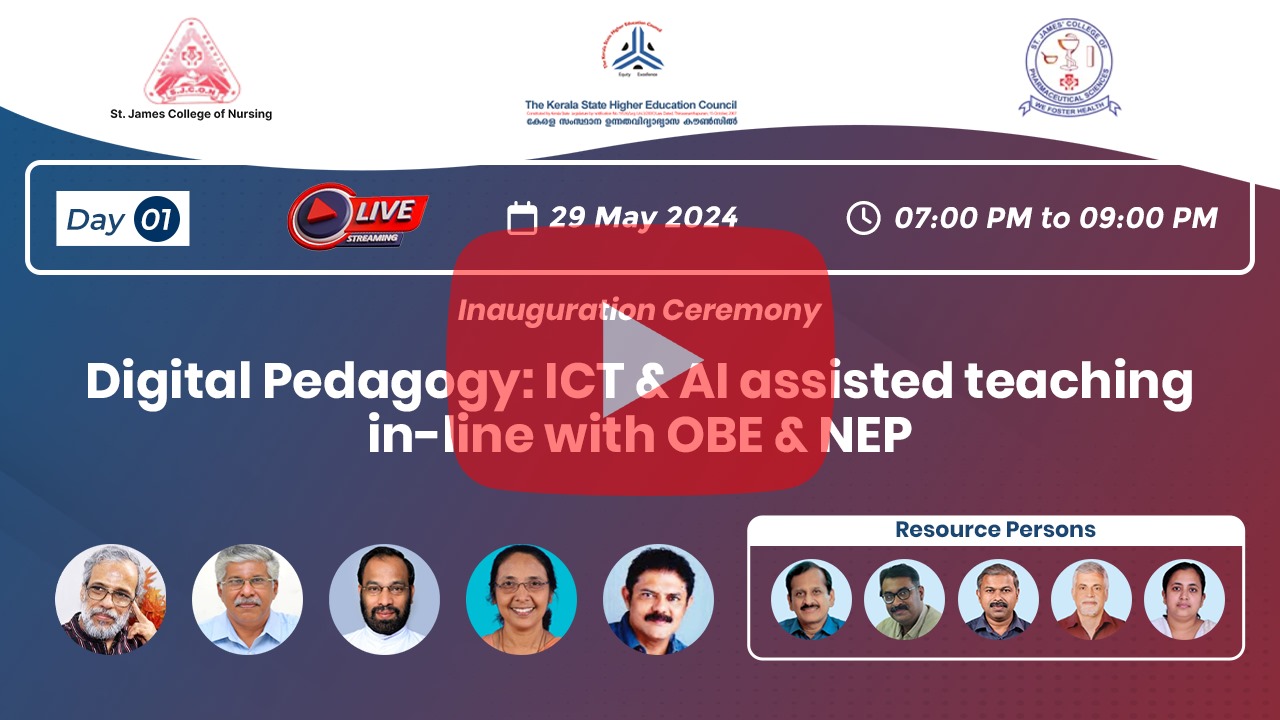
During the first day session, Dr Mendus expressed his hope that the participants would be aware of the digital platforms used in the teaching-learning process and expressed his hope that a majority would have used these platforms in one way or two. He informed that the main purpose of this FDP was to provide an idea about the effective usage of digital technologies and AI platforms for teaching-learning assessment activities. Dr Mendus mentioned that the first day’s session will be regarding some tools which can be used for online learning.
Dr Mendus started the session with a brief introduction to OBE where more learning should happen and outcomes achieved. He mentioned that during this post-Covid session, the majority of the faculty are following blended learning. Dr Mendus further mentioned the major problems faced in e-learning and how to explore the Moodle platform. He also mentioned some of the introductory courses which could be implemented on the campus for students.
During the session, Dr Mendus took a Mentimeter survey on “How Much Digital Are You”, where the participants should give their views on Menti.com. He also explained the features and the process by which one can create an account in Mentimeter.
After discussing Mentimeter, Dr Mendus discussed the Padlet platform, its various uses, and how to create an account in Padlet. Dr Mendus took a second survey on “Your Favorite Teacher” using Padlet. After the Padlet session, Dr Mendus discussed AI platforms where he discussed “Questionpaper.ai” and the process of generating question papers using the software.
The second day’s session of the week-long Faculty Development Programme on Digital Pedagogy: ICT & AI Assisted teaching in line with OBE & NEP was handled by Dr Sunil Job on the topic of Digital Pedagogy and Moodle.
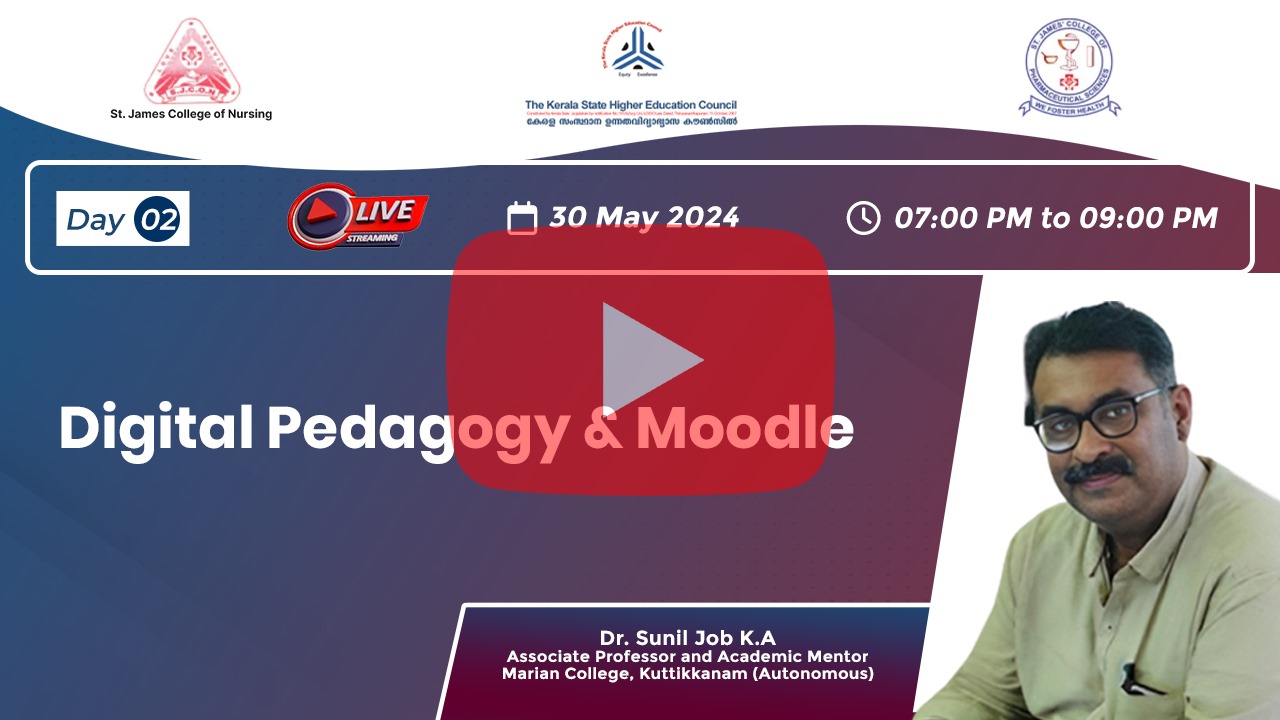
Dr Sunil started the session by mentioning that digital platforms are very important considering students’ involvement/participation. He stated that this FDP aims at creating a more effective method of the teaching-learning environment coming into blended mode. Dr Sunil informed the participants that they would create and own an LMS of their own and later on how to customize it to suit their requirements. He stated that in the following days, the session would extend to the tools which could be used to enhance the quality of the teaching-learning environment on an online platform.
He mentioned that the Pandemic period brought us closer to new technological possibilities and innovations in the teaching-learning environment because before the pandemic nearly 80% of teaching centred around classrooms, laboratories etc. Dr Sunil presented slides on Digital Pedagogy for LMS for the participants. He started with the agenda on what needs to be expected from the presentation which included points like Digital Pedagogy, Three Models for Digital Learning, Constructivism, Connectivism, Experiential Learning, Problem-Based Learning, Revised Bloom’s Taxonomy, Curriculum Frames for LMS and Frame Model for Curriculum Arrangement. Dr Sunil explained in detail each of these points in a well-structured manner with adequate examples for better understanding. He also introduced a few tools that could be used effectively for digital learning. The session concluded with the creation of a Moodle Site for all participants.
Dr Suresh Namboothiri was the resource person on the third day of the one-week-long Faculty Development Programme on Digital Pedagogy: ICT and AI-Assisted Learning in line with OBE and NEP. The third day’s topic was Pedagogical Excellence through Generative AI.
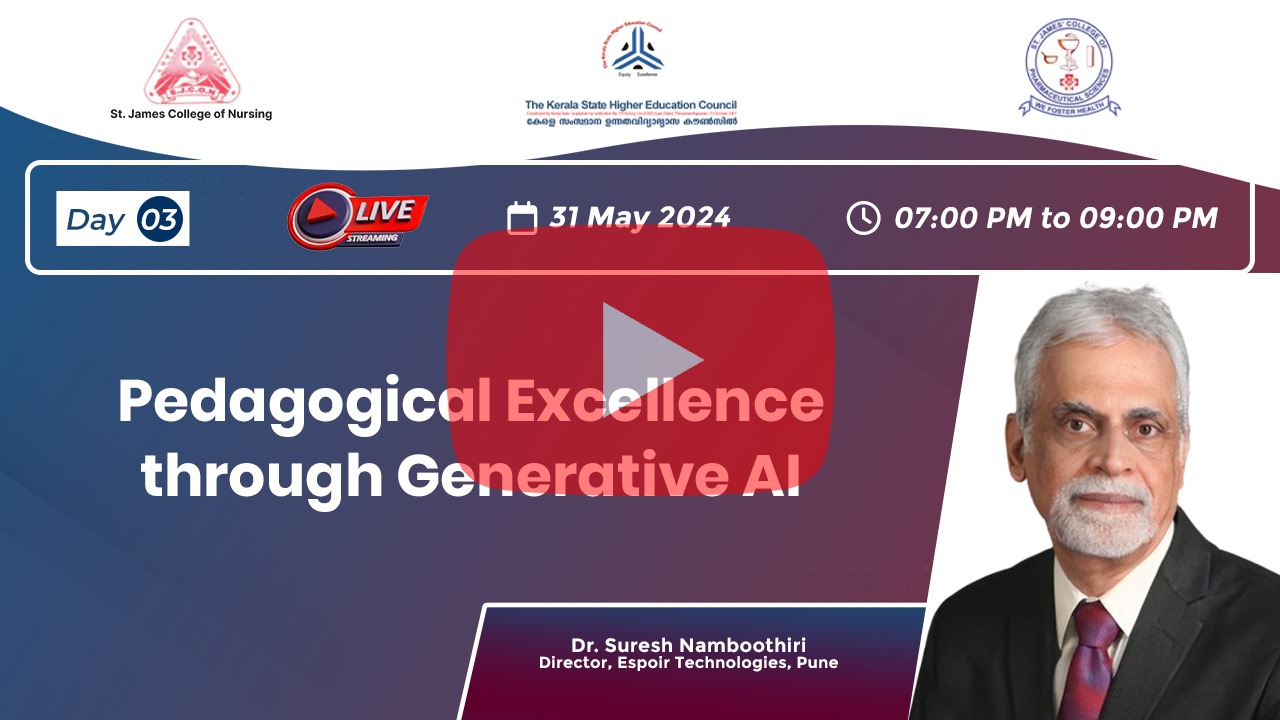
Dr Namboothiri started the session by mentioning that Generative AI is giving way to a new world of no-cord software where common sense plays the central role, and he stressed that one should have a general concept of Generative AI. Dr Namboothiri presented the slides on Hundred Plus Smart Ways to use Chat GPT for an Exciting Classroom where he discussed the importance of prompting and how one can effectively use prompts to attain better results/outcomes.
Dr Namboothiri mentioned that without proper knowledge in prompting, the results that one obtains while searching the internet will be below standard level. He mentioned that the quality of questions decides the quality of answers ChatGPT generates or in other words, if one asks the right questions to ChatGPT, it will provide the right answers. Dr Namboothiri informed that Prompt Engineering involves creating specific instructions or questions to guide the output of a language model and it gives users control over the model’s output, enabling the generation of text tailored to their unique needs.
During the session, Dr Namboothiri discussed in detail things ChatGPT can do for pedagogical excellence, how students can benefit from using ChatGPT while facing examinations and the various ways students can use ChatGPT for their benefit and finally the diverse uses of ChatGPT in the education sector.
Three tasks in the form of MCQs were assigned to the participants to check their understanding of the subject.
Dr Sunil Job handled the fourth-day session of the week-long Faculty Development Programme on Digital Pedagogy: ICT and AI-Assisted Teaching in line with OBE and NEP. The third-day session was based on the topic of Moodle.
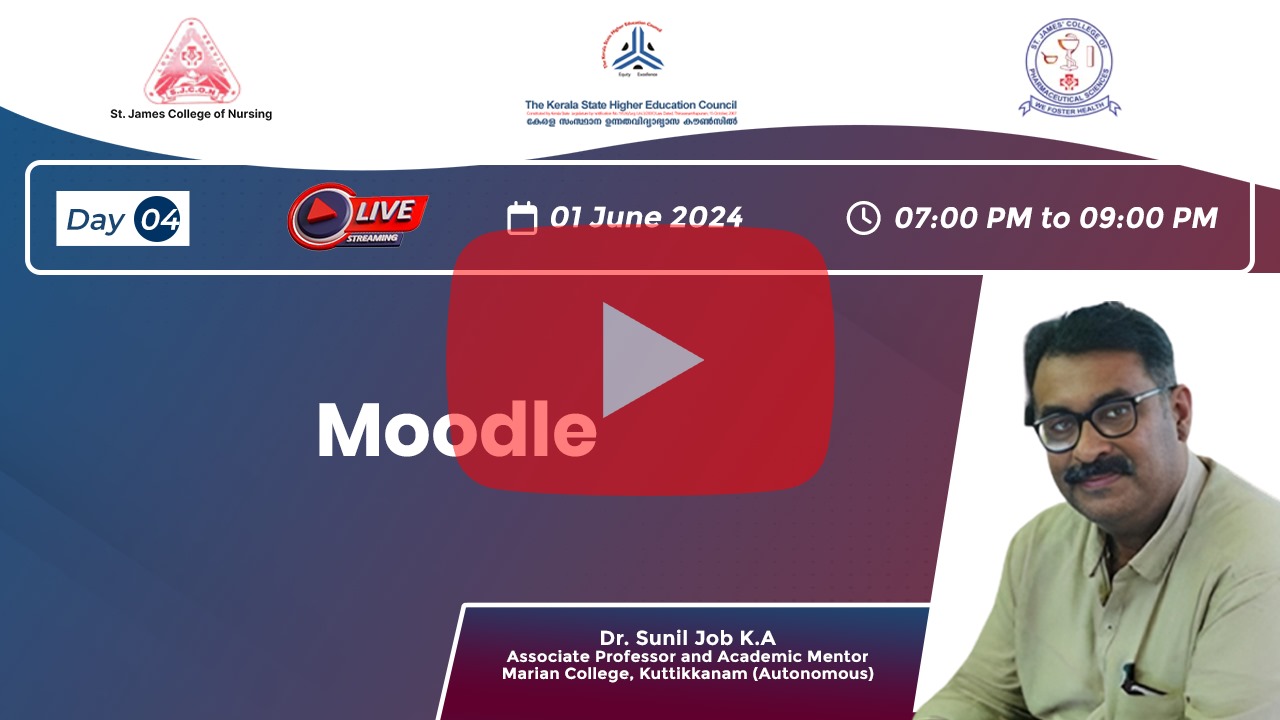
Dr Sunil started the fourth-day session by briefly introducing what was discussed during the second day of the Faculty Development Programme. He stated that LMS must be an individualised instructional platform where the students must be able to progress through the learning activities at their own pace with a diverse set of activities and proper evaluation confirming they are progressing the right way. There should also be a provision for the faculty to monitor student progress. He further stated that the New Education Policy permits faculty to deliver their signature courses to a wide range of students globally.
Dr Sunil then discussed Moodle, a platform for online learning that enables the creation of online courses, adding assignments, and tracking students’ progress. It also allows to communicate with the students and encourages communication between them in forums and discussions. He further demonstrated how to open a Moodle account and assisted the participants in creating one on their own and including users/courses/videos etc.
Ms Kochumol Abraham was the resource person on the fifth day of the National Level Online Faculty Development Programme on Digital Pedagogy: ICT and AI-Assisted Teaching in line with OBE and NEP jointly organised by the Internal Quality Assurance Cells of St James College of Pharmaceutical Studies and St James College of Nursing Chalakudy in association with The Kerala State Higher Education Council.
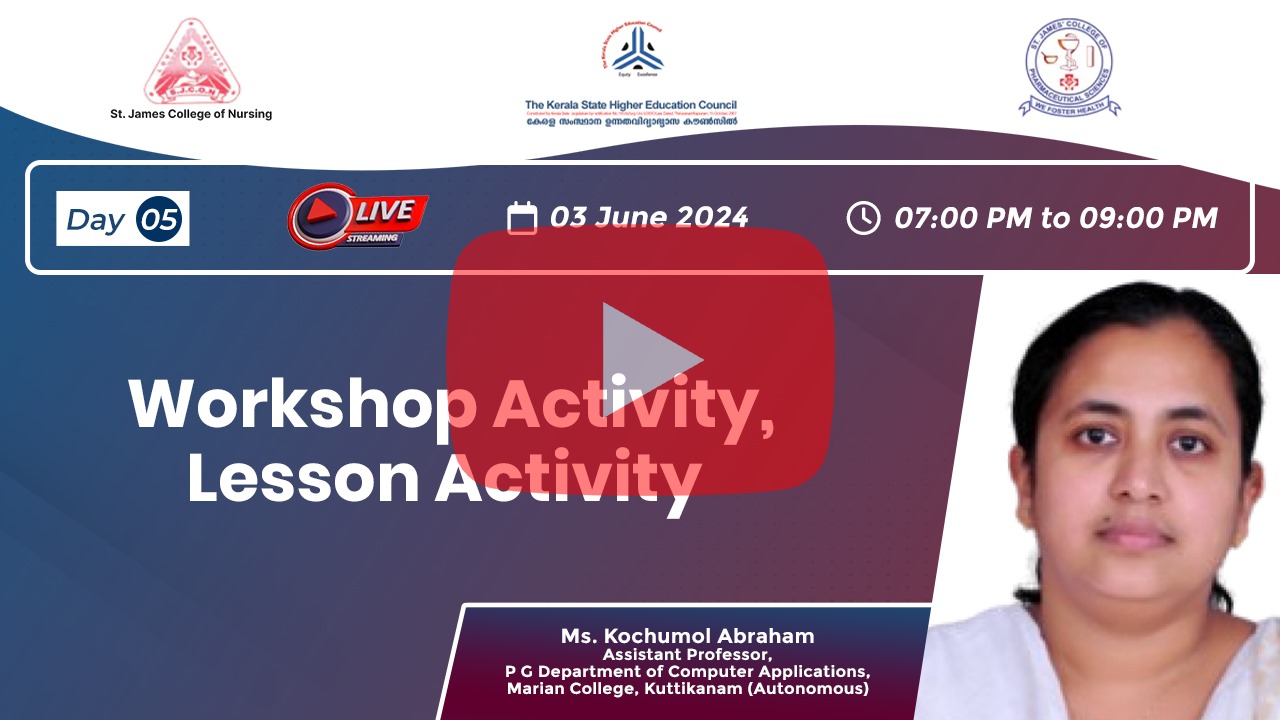
Ms Kochumol mentioned that she will deal with two important features/activities that Moodle has, the Lesson Activity and the Workshop Activity. She started the session by presenting a slide on Lesson Activity. She stated that the most important tool Moodle uses for adaptive learning in terms of OBE is Assurance of Learning and Moodle provides this through the Lesson Activity. She further explained that one must create the content needed for sharing before it is shared with the students. She explained the process by showing an activity she practices in her institution for a better understanding of the participants. Dr Kochumol then demonstrated how a lesson activity can be created through Moodle where she explained point by point the process involved in it.
After explaining the Lesson Activity, Ms Kochumol went on to explain regarding Workshop Activity. She stated that while the Lesson Activity is designed for Assurance of Learning, the Workshop Activity is for Assessment/Peer Evaluation. Similar to the Lesson Activity session, Ms Kochumol explained step by step the process of implementing Workshop Activity in the classroom.
After completion of the session, the participants were assigned a task on Course Outcome and Quality Check.
Dr Suresh Namboothiri was the resource person on the sixth day of the one-week National Level Online Faculty Development Programme on Digital Pedagogy: ICT and AI-Assisted Teaching in line with OBE and NEP with the topic Generative AI for Research.
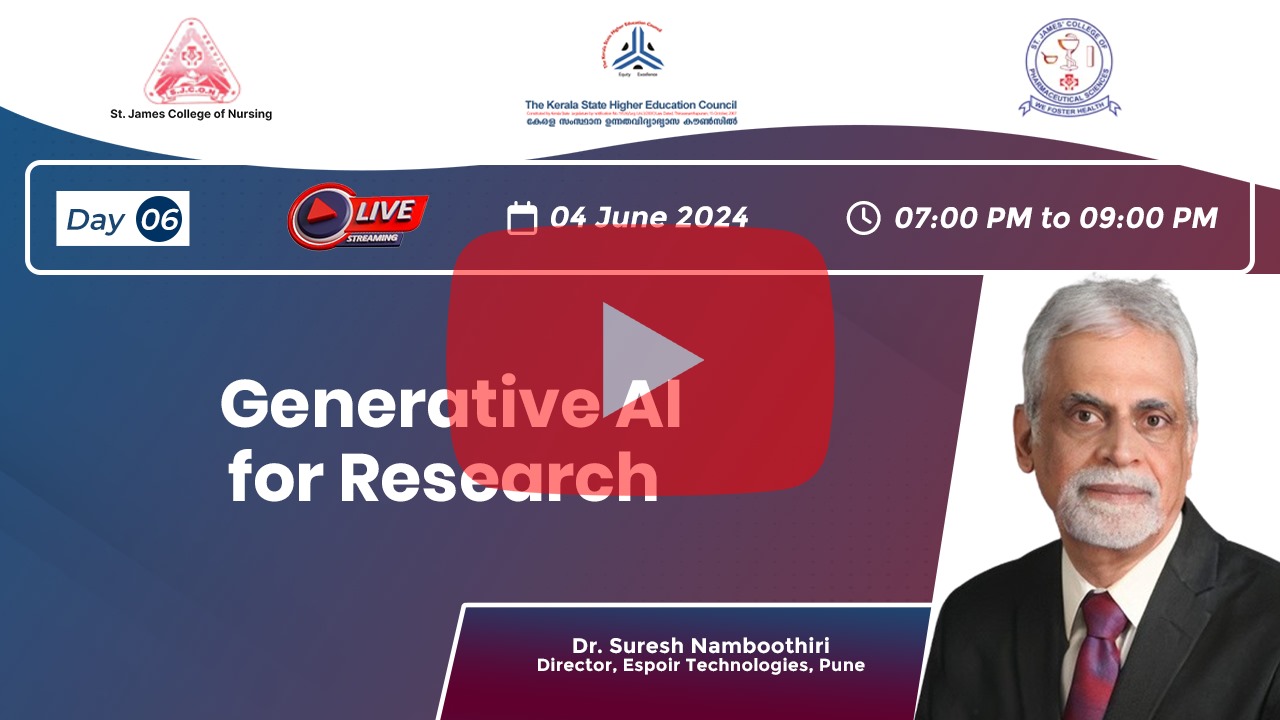
Dr Suresh Namboothiri started the sixth day’s session based on the topic of Generative AI in research, where he introduced various AI tools for searching literature and literature reviews. During the session, he stated that while ChatGPT, Perplexity, Jenni, Wisio, Bard etc. are some of the best AI tools for Content Generation, tools like Paper Digest, Openread, ChatPDF, Wordtune, PDF gear etc. are some of the best AI tools for Chat / Summarise / Paraphrase etc. in research matter. He further went on to mention that AI must aid the researcher in rapidly broadening and refining ideas, providing a fertile ground for research expansion and that with AI’s inherent critical thinking enhancer, it must push a researcher’s analytical abilities to new heights, thereby ensuring multi-dimensional problem-solving. During the session, Dr Namboothiri went on to discuss the twelve reasons why Generative AI doesn’t lead to Plagiarism.
He also introduced “Vigyana” – a very special platform for high-impact research and publications. He mentioned that this platform will assist through research methodology, Artificial Intelligence, Prompt Engineering, and Critical Thinking even if one has limited research knowledge. He explained in detail how the platform functions in assisting people in research.
A task was assigned to the participants after the completion of the session.
Dr Binu Thomas was the resource person on the final day of the week-long Faculty Development Programme on Digital Pedagogy: ICT and AI-Assisted Teaching in line with NEP and OBE, organised by the Internal Quality Assurance Cells of the St James group of Institutions, Chalakudy in association with The Kerala State Higher Education Council. The day’s topics were Wiki, Database Creation, LTI, and Best Practices.
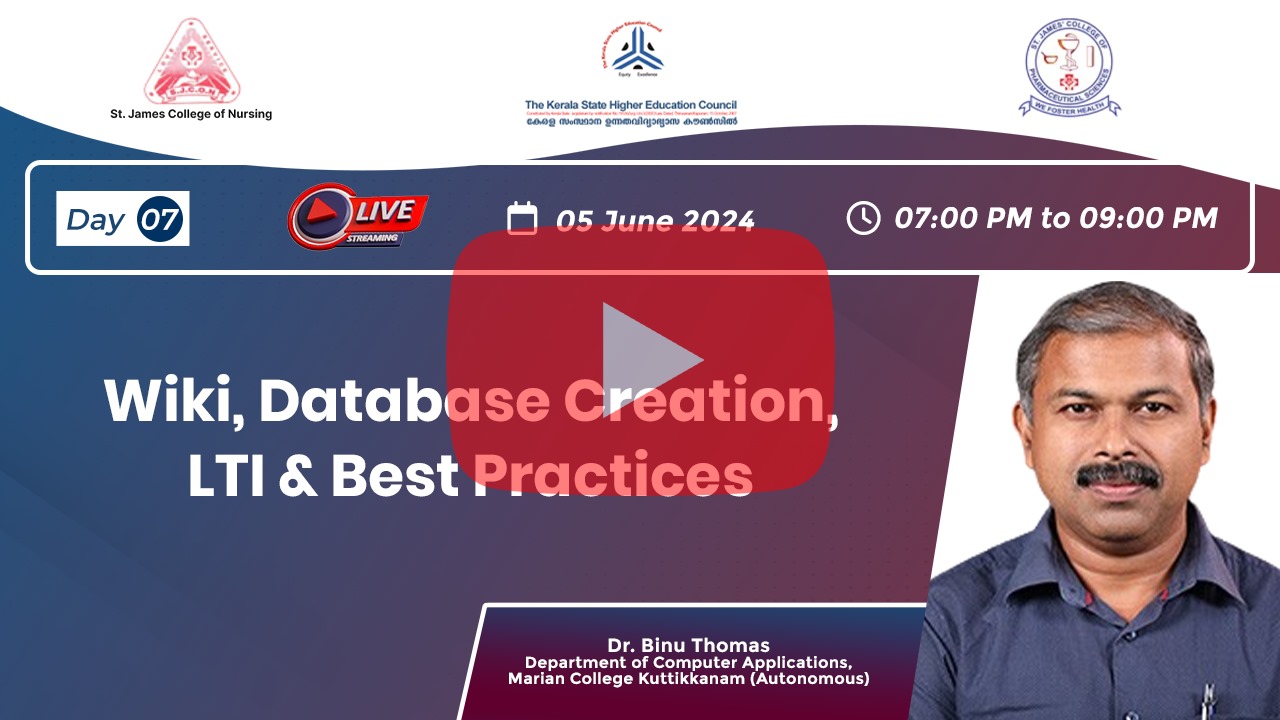
Dr Binu started his session by thanking the organisers for inviting him to deliver the last day’s session. He started the session by explaining that a Database is an organized collection of related information. He stated that various reasons for having collections of related information in Moodle are that information can be clubbed and stored together and used as an assessment activity. Dr Binu further explained the process of creating a database and entering details by giving a demonstration along with the lecture.
After the demonstration, Dr Binu showed the participants the second activity namely Learning Technology Interoperability (LTI) conducted a Mentimeter survey about the participant’s preference regarding the topics to be covered for the day. Dr Binu stated that through Learning Technology Interoperability, one can interchange/interconnect the powers of all the applications. He proceeded to the process of creating data in the Learning Technology Interoperability platform. Dr Binu also took time to clear the participant’s doubts in between the sessions.
Word of Thanks:
The Word of Thanks was delivered by Sr Dr Jijimol Mathew, Principal, St James College of Nursing. In her speech, Sr Dr Jijimol expressed her heartfelt gratitude to Dr Rajan Gurukkal and Dr Rajan Varghese, the honourable Vice Chairman and Member Secretary respectively of The Kerala State Higher Education Council for accepting the proposal for conducting the One-week Faculty Development Programme and their support and guidance throughout. She thanked all those involved in making the programme a huge success especially the participants from all over India and a few from abroad who took time to attend the programme despite their busy schedules. Sr Dr Jijimol specially thanked the resource persons and all team members from ipsr solutions limited for their wholehearted efforts in making the programme a success. She concluded by thanking the management of St James Academy, especially Rev Fr Dr Anto Alapadan, Rev Fr Manoj, and Dr K Krishna Kumar for their support and assistance throughout the session. She took time to convey her gratitude to Sr Frincy Joseph, the IQAC Coordinator, St James College of Nursing for her efforts in making this event a success.
Join us for FREE to get instant email updates!
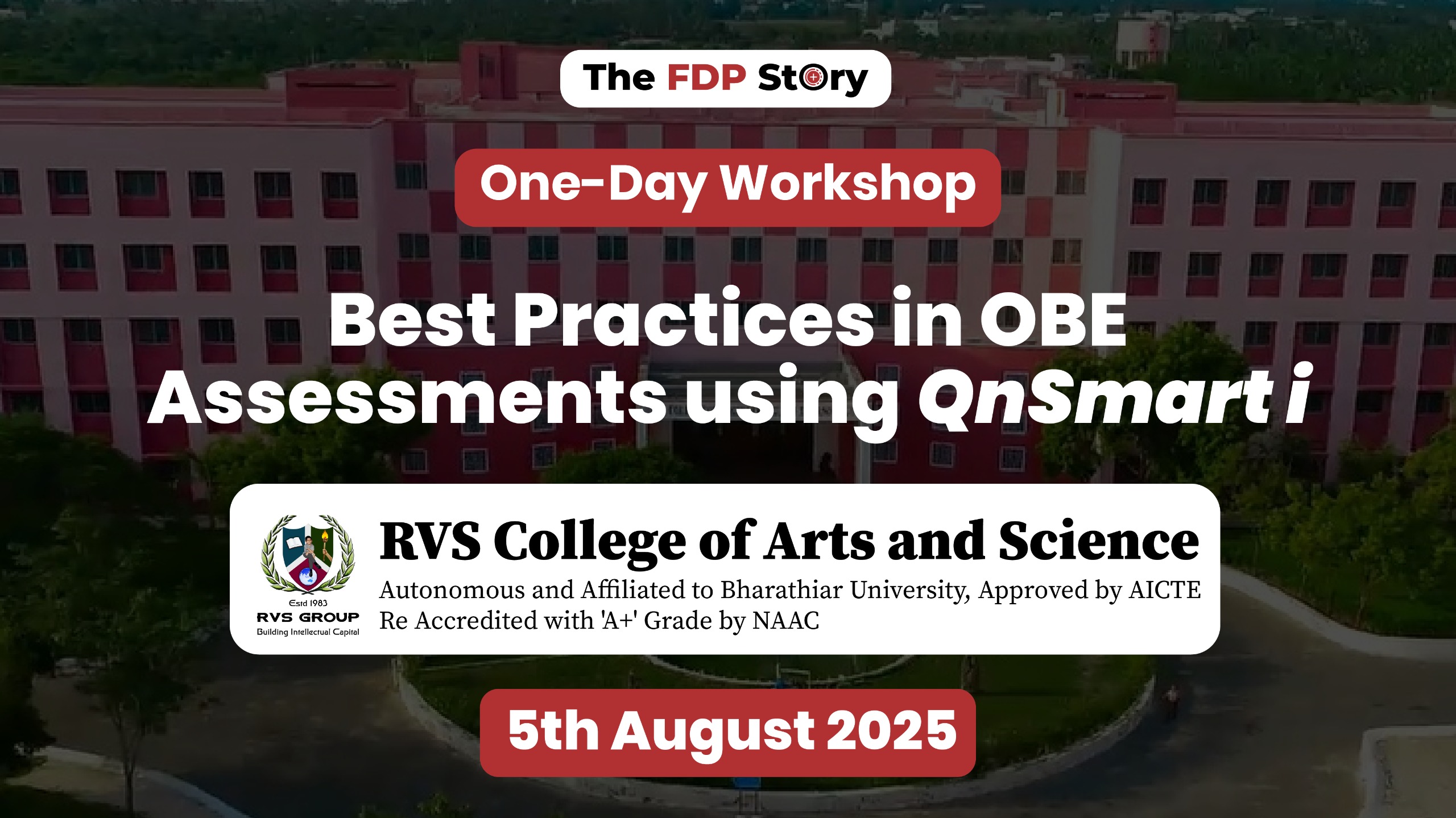
The Internal Quality Assurance Cell (IQAC), in collaboration with the […]
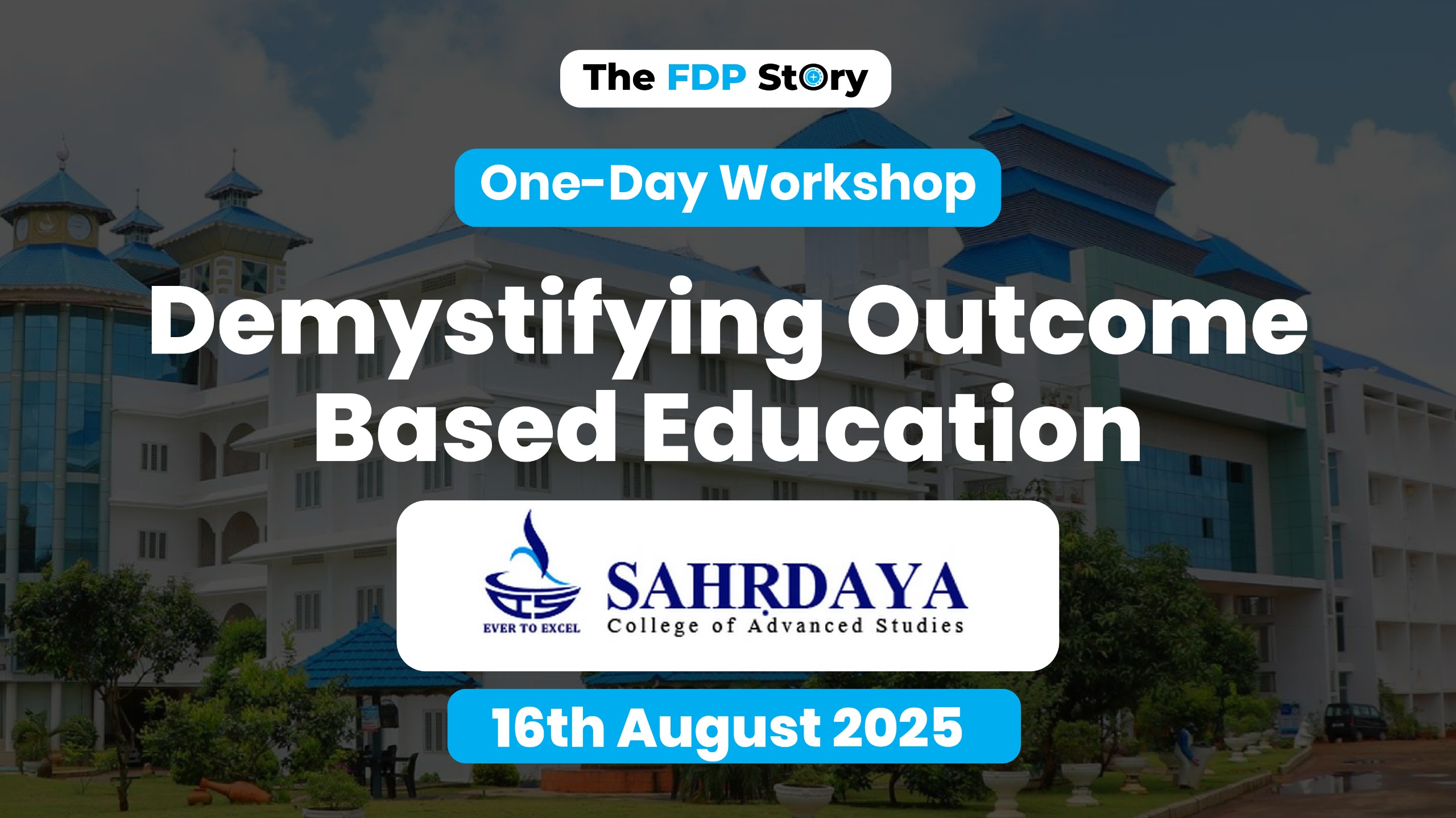
A one-day workshop on Demystifying Outcome-Based Education (OBE) was successfully […]
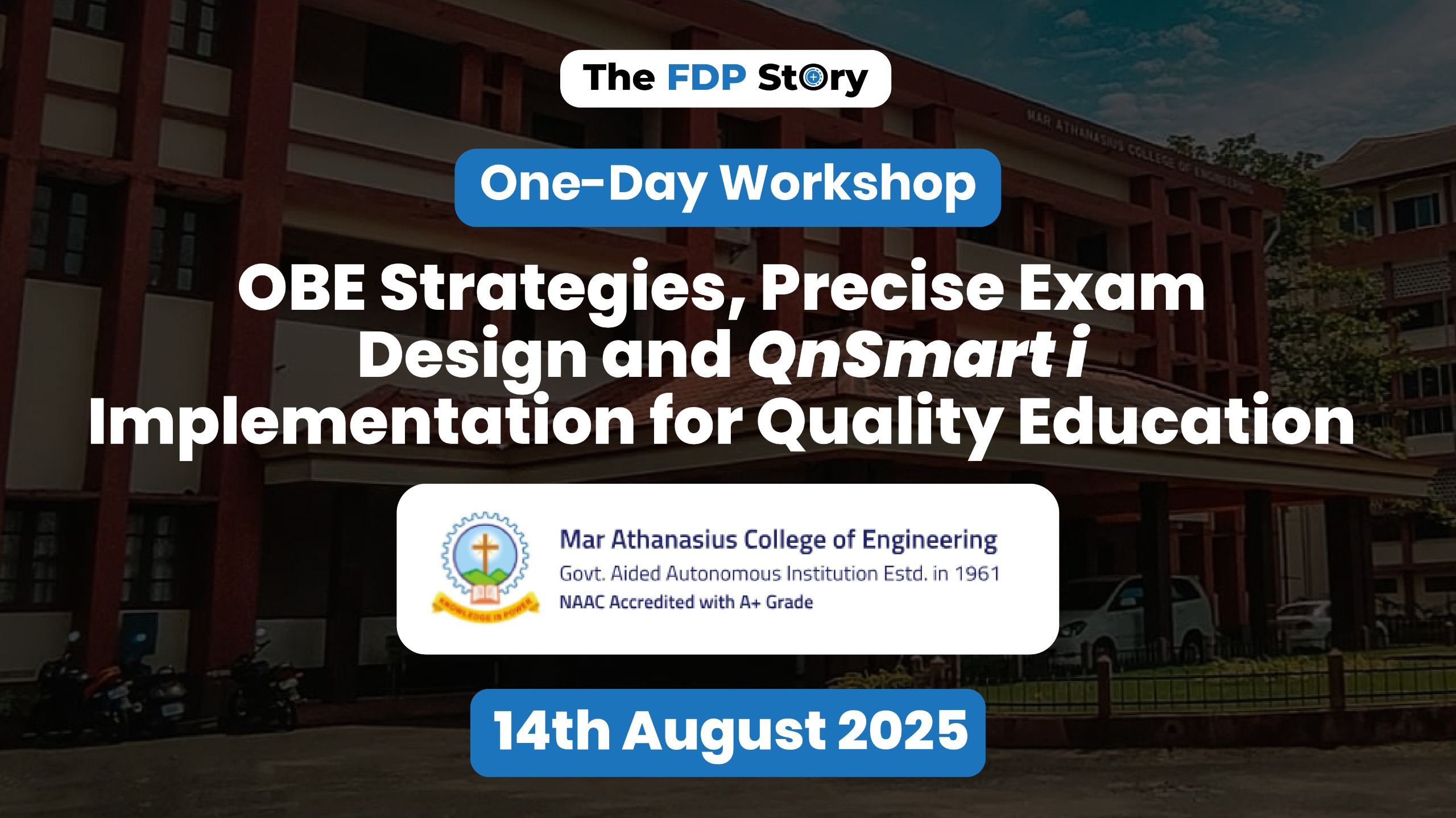
As part of Mar Athanasius College of Engineering’s continuous pursuit […]
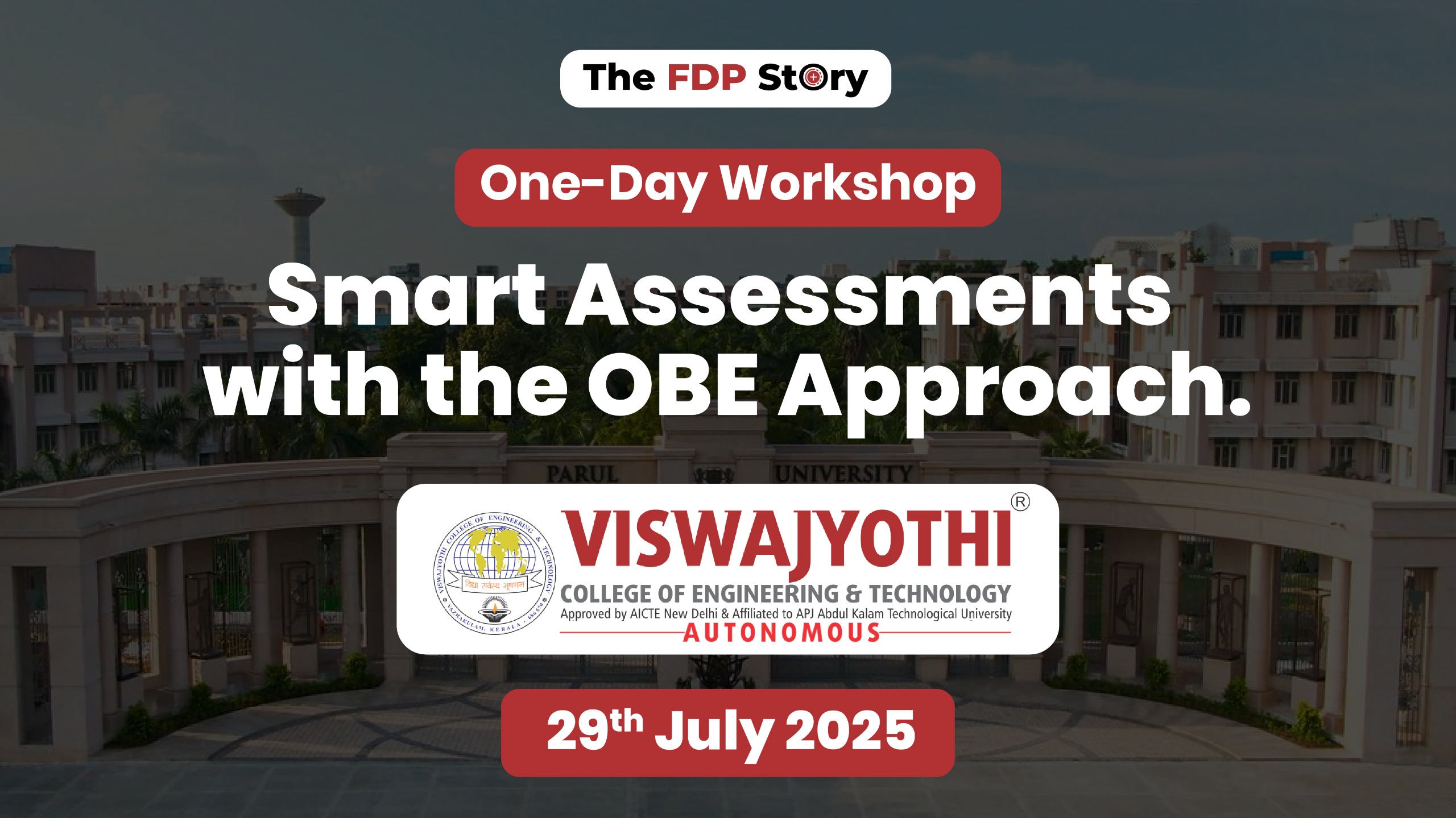
A one-day workshop on Smart Assessments with the OBE Approach […]
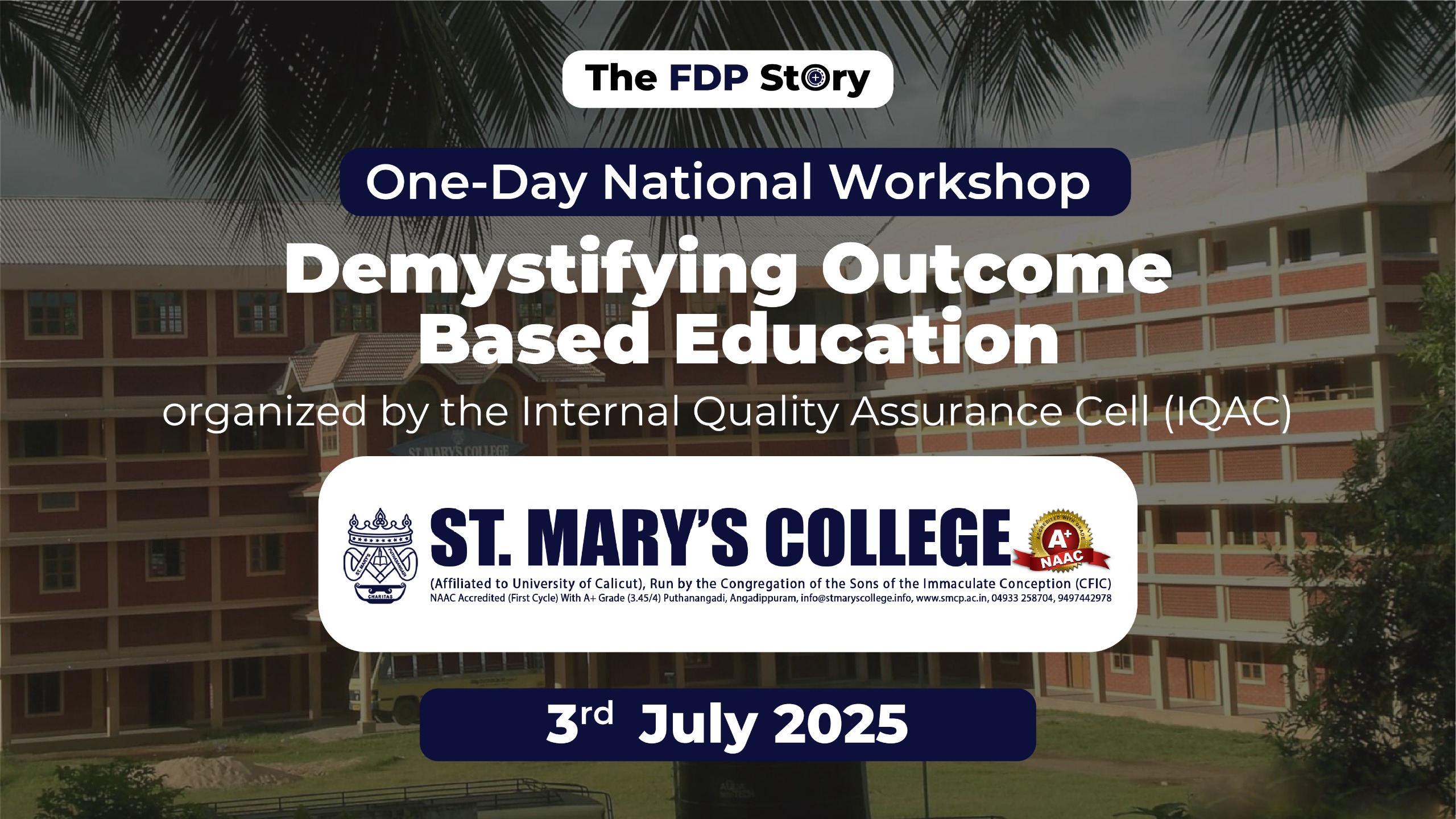
A one-day national-level workshop on Demystifying Outcome-Based Education (OBE) was […]
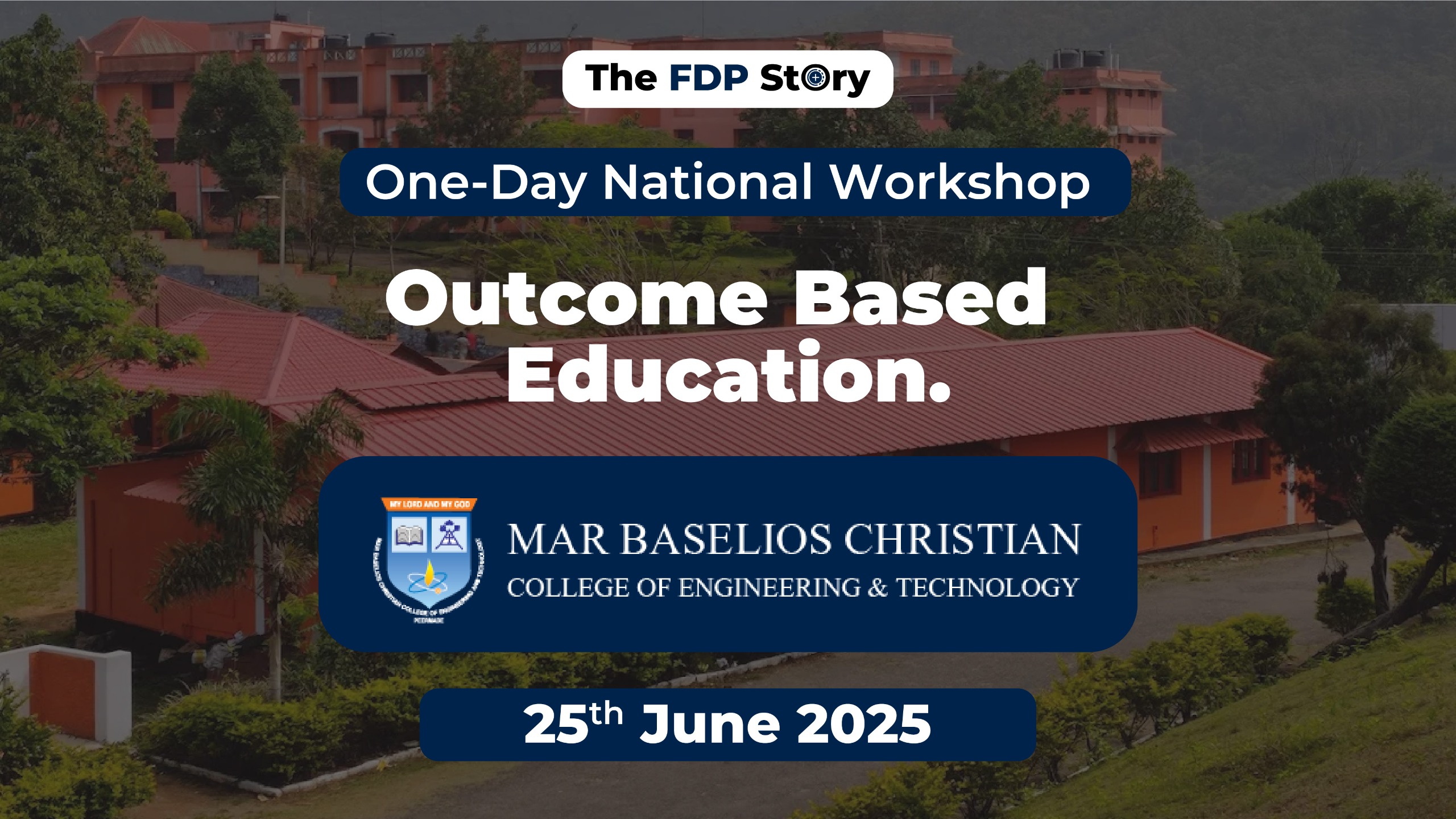
The Faculty Development Programme on Outcome Based Education (OBE) was […]

St. John Group of Institutions, under the Aldel Education Trust, […]
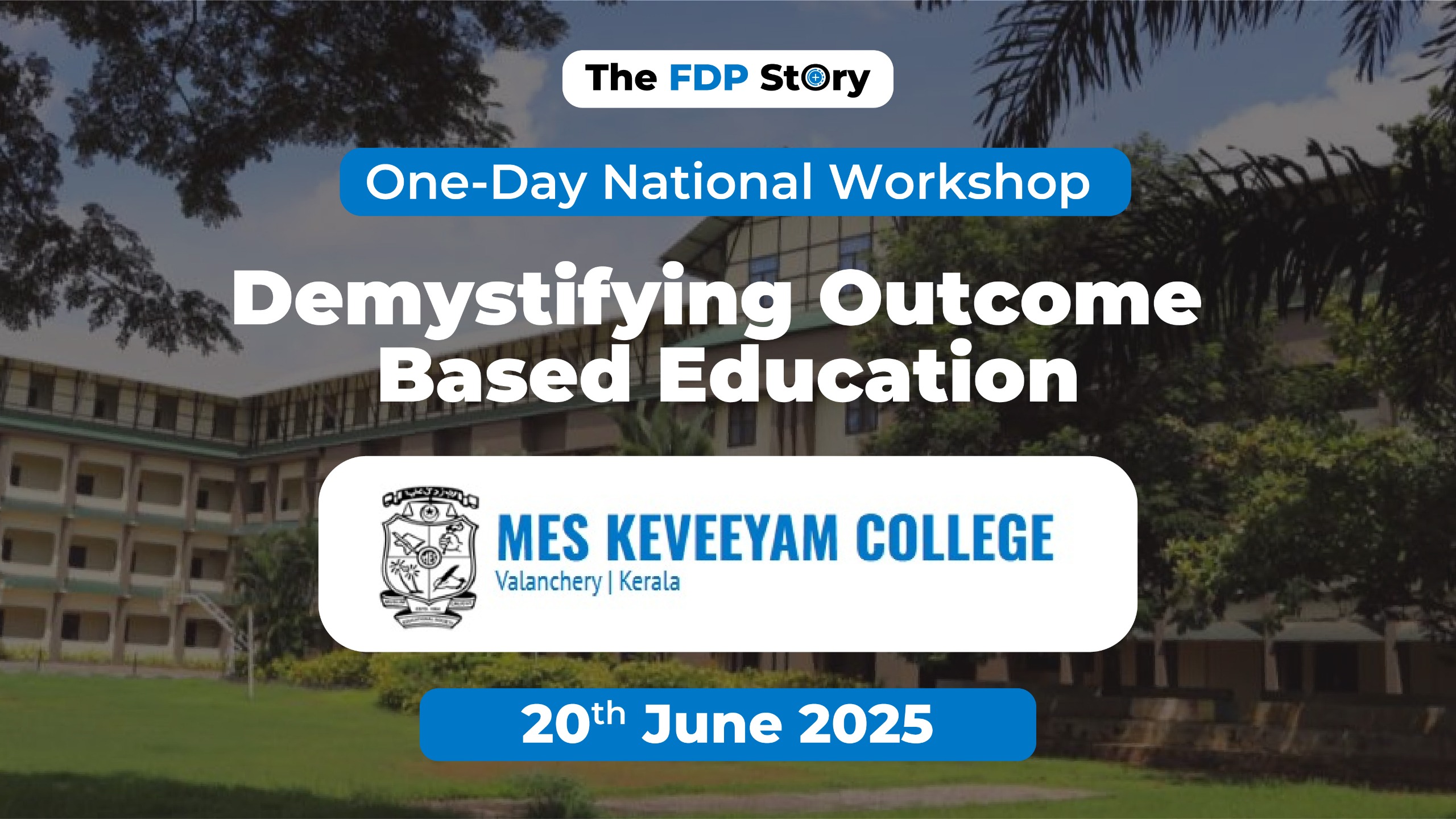
MES KEVEEYAM College, Valanchery, Malappuram, successfully hosted a One-Day National […]

As part of Parul University’s continued commitment to enhancing academic […]
Leave A Comment